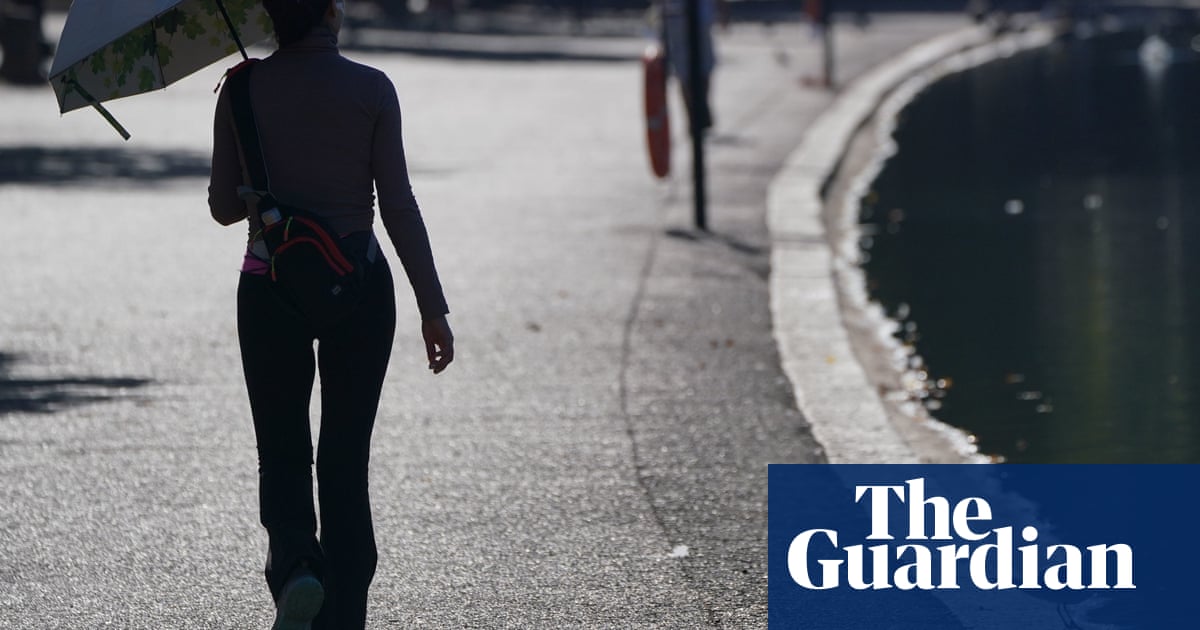Call me a killjoy, but I agree with Zoe Williams (Why do we pretend heatwaves are fun – and ignore the brutal, burning reality? 23 June). It’s not just because I’m a fading redhead with fair skin, freckles, vitiligo and a need for factor 50 protection. I enjoy feeling warm to my bones as much as anyone. Today, the world is hotter than it was when I was a child. I’m now 68 and science has been predicting ahotter climatefor many years. People around the world aredyingbecause they are overheating.
Does anyone care? The opportunity to build in human-centred solutions to warming is being missed – for example, into urban housing and for vulnerable people, so we are incredibly underprepared for the human tragedy being forecast by scientists. I’m worried for my children and grandchildren. What kind of world are we building?
It’s one thing to build in public announcements about how people can stay cool in the heat – obvious things like hydration, sunscreen and keeping curtains closed. ThePhysiological Society’s roadmapfor dealing with climate change points the way for multidisciplinary approaches to finding solutions for policymakers and infrastructure, but I fear that the current emphasis on mitigating warmongering means that long‑term heat-related challenges are being ignored.Dr Laura M GinesiYaxham, Norfolk
While much of England has been sweltering under amber heat warnings, another crisis is quietly intensifying: wildfires are fast becoming Britain’s most overlooked climate emergency. Already this year,more than 560 wildfireshave been recorded in England and Wales – a sevenfold rise on the same period in 2024. From scorched moorland to motorway verges, fire crews are stretched to breaking point. Many blazes are caused by disposable barbecues, cigarettes or littered glass – small acts with catastrophic consequences. Peatlands and woodlands, vital carbon sinks and havens for biodiversity, are being destroyed acre by acre.
Yet we have no national wildfire strategy. No consistent bans on open fires during high-risk periods. And fire services, cut to the bone, are being left to improvise in the face of this new normal. This is no longer a Mediterranean problem. Without urgent national action, the UK will face a cycle of summer infernos. Ministers must restore funding to fire services, introduce fire-source bans during alerts and establish a properly resourced wildfire response plan. Anything less is climate complacency.Antony David DaviesShrewsbury, Shropshire
The way in which the media positively presents extremely hot and dangerous weather using words such as “beautiful” and “lovely sunny day” infuriates me. Such descriptions are personal value judgments and should be kept out of objective reporting. All that can be said objectively is that it is hot. My immune system struggles to cope with the heat because of medication to help prevent the recurrence of breast cancer. High temperatures and humidity leave me exhausted and forced to seek refuge indoors. I long for more benign weather, days where I can go about my normal life without being forced to opt out until it passes.The binary view that hot weather equals good and cold/wet weather equals bad must be readdressed in light of current climate challenges if we are to stand any chance of persuading everyone to do their bit to protect the environment.Helen PeeblesStamford, Lincolnshire
The recentreport by the Met Officethat temperature highs of 45C are now possible in the UK shows how quickly we are sliding into new and wholly terrifying climatic territory. Talk of adaptation and resilience is beside the point – we need emergency decarbonisation to slow the growth of extreme heat, and to salvage something of the climate niche within which human societies have grown and thrived.Jason Scott-WarrenCambridge
